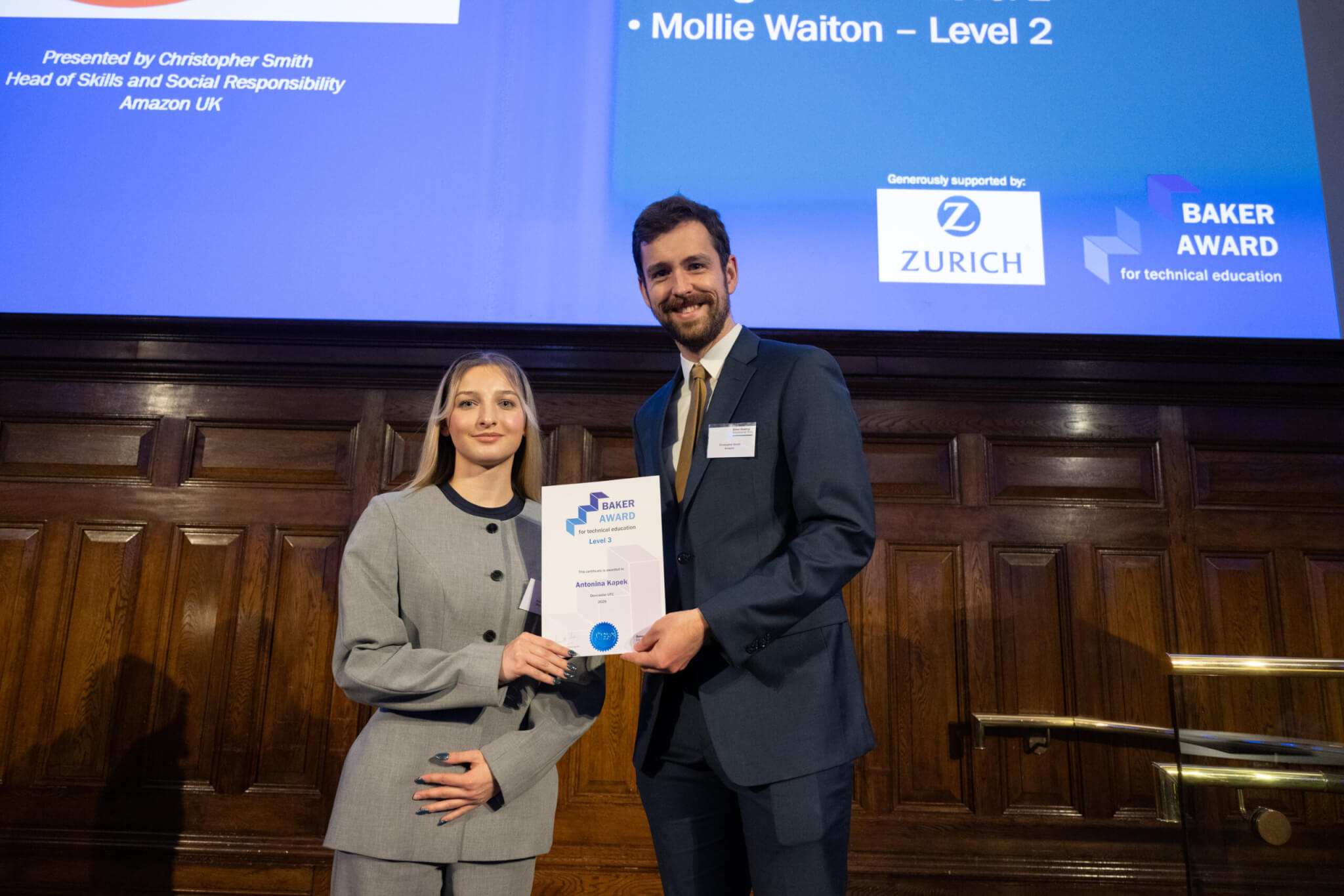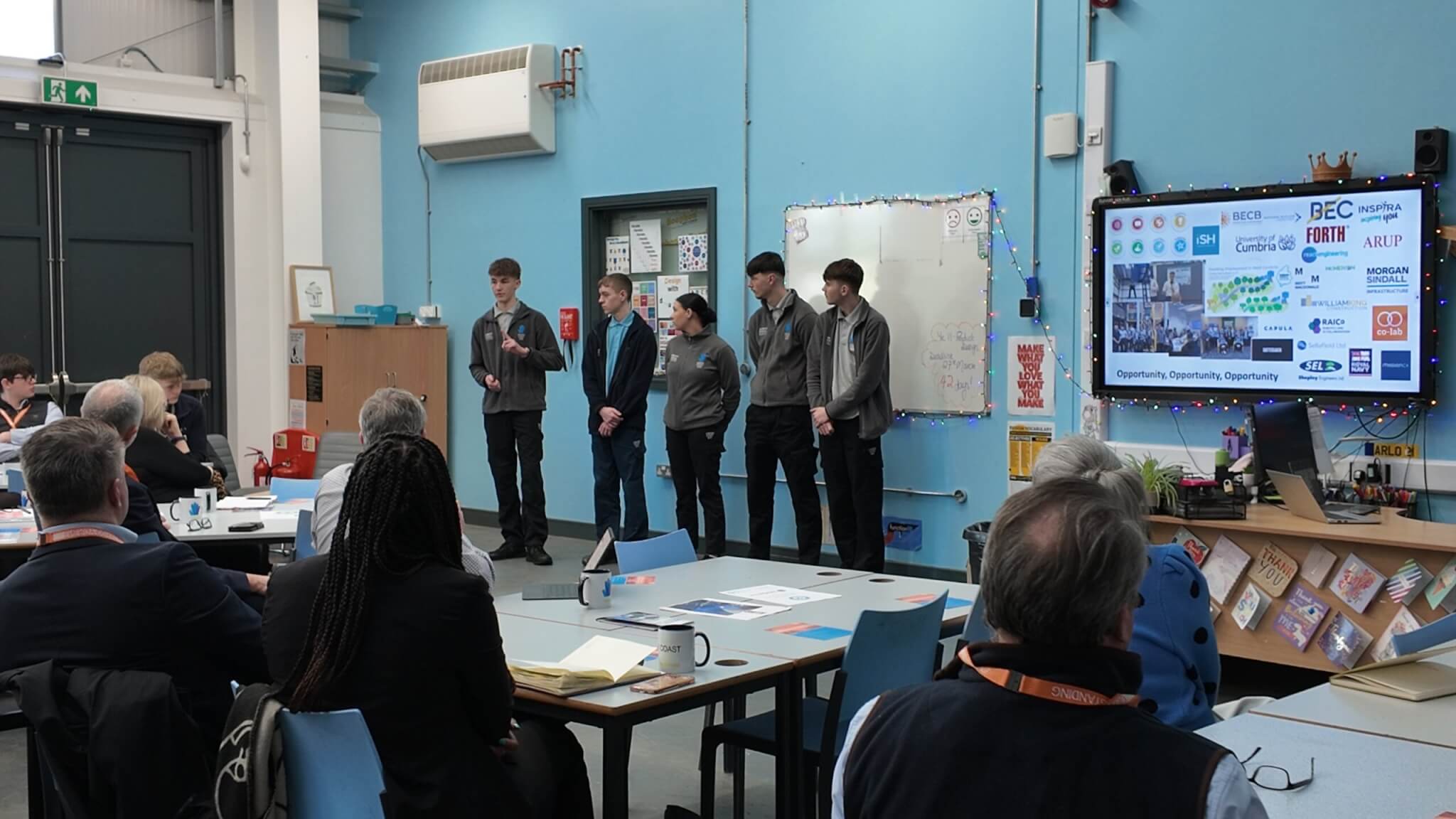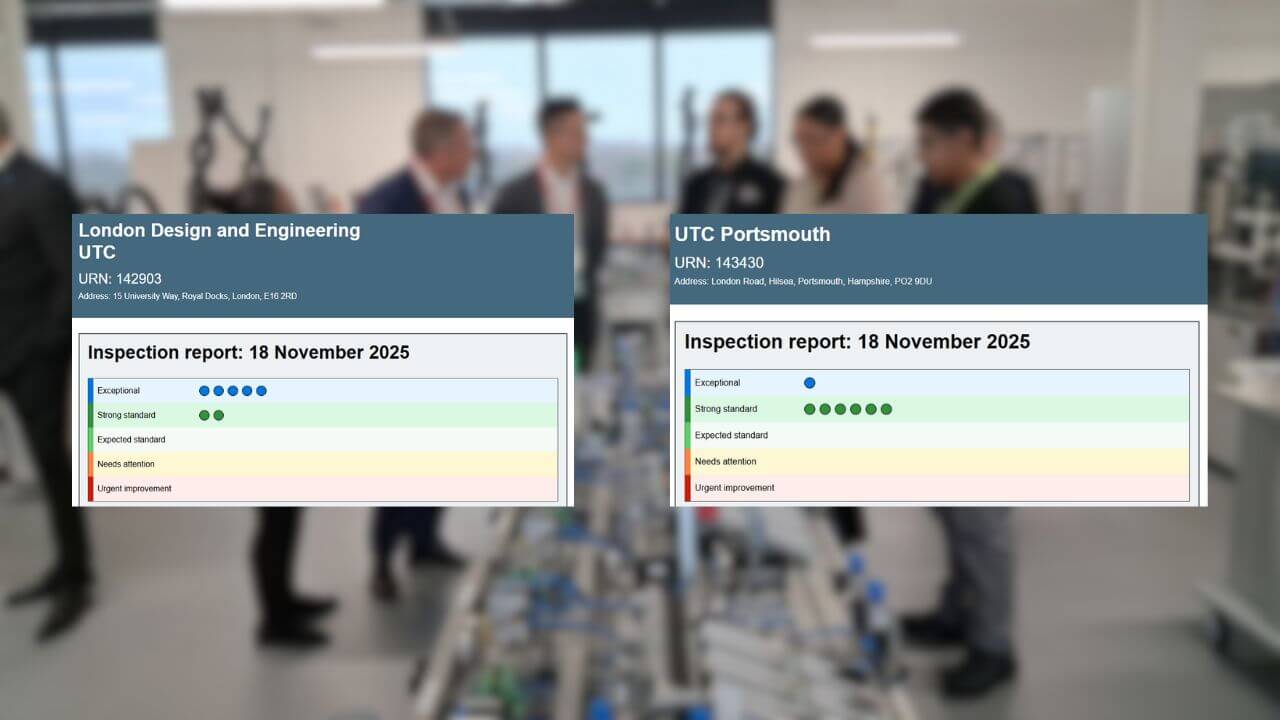Former Skills Minister and Chair of Baker Dearing International Robert Halfon addressed the Greater Manchester Festival of Technical Education on Wednesday 2 July, as it was announced the Baker Dearing Educational Trust will be working to implement our UTC Sleeve initiative in the city.
Halfon told the festival that “trailblazing” UTCs are part of the infrastructure to deliver Manchester Mayor Andy Burnham’s innovative Manchester Baccalaureate (MBacc), which would create several technical education pathways for the area’s young people. A clip from his speech can be viewed below.
The MBacc, which was the focus of the summit at which Halfon was speaking, fits perfectly with Baker Dearing’s UTC Sleeve proposal. This initiative would create a high-quality, employer-led technical education pathway – focusing on local industry specialisms such as engineering and digital – within an existing mainstream school.
During the summit, it was announced that local authorities would work with Baker Dearing to “explore the UTC Sleeve in Greater Manchester.” This could expand to more young people the benefits of a UTC education, which last year progressed a fifth of Year 13 leavers to apprenticeships. Three-fifths of those apprenticeships were at the higher or degree level.
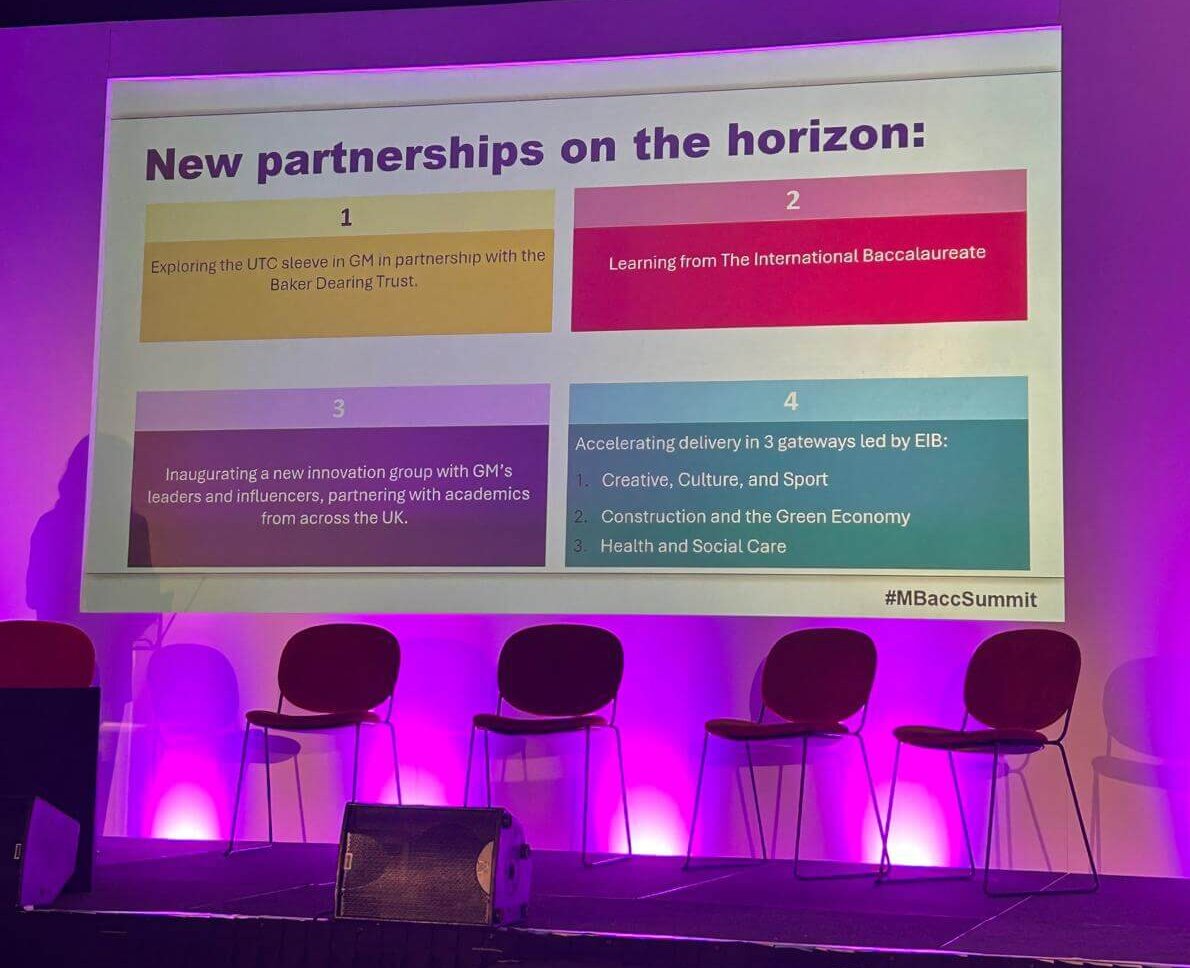
The Manchester City Region is already well served by three UTCs: UTC Media City in Salford, UTC Warrington, and University Collegiate School (UCS) in Bolton. UCS has recently produced a video for the Greater Manchester Combined Authority about technical qualifications, which will be released soon.
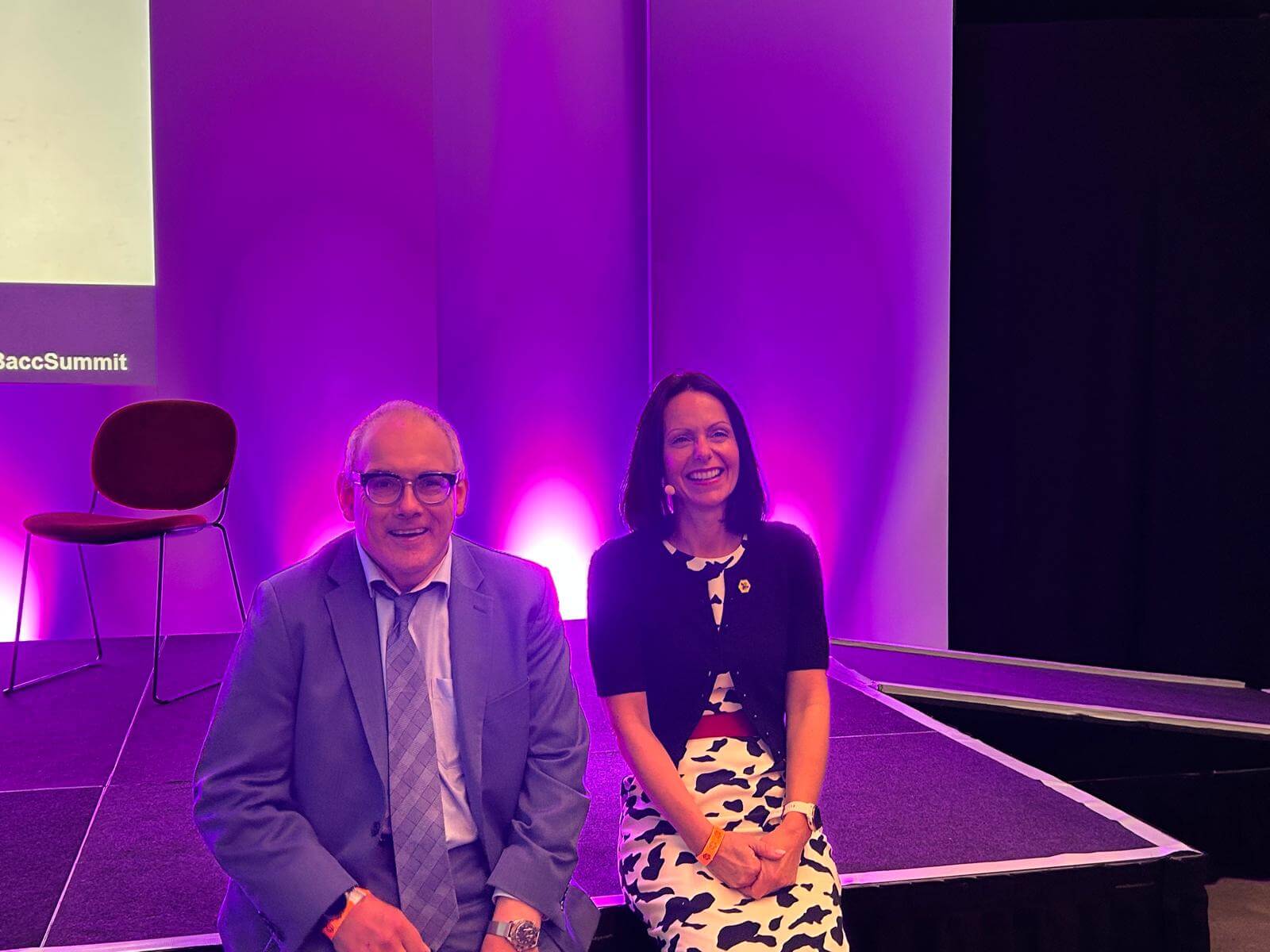
The full text of Robert Halfon’s speech can be found below.
Robert Halfon: The Ladder of Opportunity: Building a World-Class Technical Education System in Greater Manchester
Good morning. It is wonderful to be here in a city that has always understood the power of making things—a city that has, for centuries, forged the future.
I want to start not here in Manchester in 2025, but 109 years ago, on the battlefields of the Somme.
Picture a young signal officer from the 11th Battalion, the Lancashire Fusiliers. His job, amidst the chaos and confusion, was to maintain communication between the front line and headquarters so that vital decisions could be made. That young officer was Second Lieutenant J.R.R. Tolkien. His regiment’s home is just up the road in Bury. His service revolver now rests just a few miles from here, in the Imperial War Museum North. His son, Christopher, was stationed at Heaton Park during the Second World War.
On the Somme itself, the men of the Salford Pals nicknamed a part of the battlefield ‘Boggart Hole Clough‘, after a park in Blackley—stamping Manchester’s identity onto the very landscape of war.
Tolkien’s mission as a signal officer—to provide a “clear line of sight” in a bewildering landscape—is what the Greater Manchester Baccalaureate achieves today: providing young people with a clear line of sight to high-quality jobs.
But Tolkien understood something else about overlooked talent. In his tale, Smith of Wootton Major, he tells of Alf, an apprentice cook who becomes an exceptional craftsman through dedication and practice. When his master departs, the villagers overlook him for promotion, choosing someone less capable but more familiar. Why? Because, as Tolkien wrote with cutting precision, Alf “wasn’t one of their own.“
That story could have been written yesterday. It captures the cultural snobbery that still shadows vocational education—the false hierarchy that places academic qualifications on a pedestal and relegates technical skills to a lower tier. It is the story of systematically overlooking talent that doesn’t fit a conventional, university-bound mould.
Manchester’s Legacy
This potential has always existed here. This city was the forge where the modern world was hammered into shape, often by apprentices.
Consider John Dalton—a Quaker barred by his faith from attending university. He began his formal education assisting his brother at just twelve years old. But while he started working as an apprentice tailor, his mind was unravelling the very fabric of the universe. He came to Manchester and was elected to the Manchester Literary and Philosophical Society, and it was here that he developed his atomic theory, which changed science forever. An apprentice tailor who became a giant of physics and chemistry. That is the Manchester way.
It is also the story of Sir Joseph Whitworth. After an apprenticeship at a cotton mill, he worked as a mechanic in Manchester before moving to London. He returned in 1833 to set up his own tool-making business, which became world-renowned for its precision. He became a passionate evangelist for technical education, investing a fortune in what is now the University of Manchester and founding the Manchester School of Design to bring “science and industry into closer relation with each other.” His life is the historical precedent for the entire MBacc philosophy.
This isn’t a new model being imposed on Manchester. It’s the 21st-century revival of a Mancunian tradition.
A Shared Mission
That is why I want to commend Mayor Andy Burnham. We may come from different political traditions, but his mission to champion vocational and technical education is extraordinary and something that should be supported by all. This festival, this summit, is symbolic of that shared commitment. He and all of you in this room have shown the bold, collaborative leadership that this agenda needs.
A Personal Mission
This isn’t just policy for me. It’s a personal mission, born from meeting teenagers in Harlow in 2008, supported by The Prince’s Trust.
They were bright, capable, and desperate to learn a skill and do an apprenticeship. But they felt locked out. Their frustration became my mission. I promised myself that I would dedicate my political life to tearing down those barriers and building a ladder of opportunity if elected.
That pledge led me to become the first MP to employ parliamentary apprentices. I am so proud that one of them, Dan Swords, is now the youngest council leader in British history. His journey proves what happens when you connect talent to opportunity.
National reforms over the past decade have transformed the prestige of apprenticeships, transformed their quality with rigorous, employer-led standards, and transformed the system to be led by employers. Those reforms have created the fertile ground for ambitious, locally-led projects like the MBacc to flourish.
The Economic Case
The case for the MBacc isn’t just philosophical—it’s rooted in the hard data of the local economy. Across the seven MBacc Gateway Sectors, employers here advertised over 212,000 jobs in the last year, more than half of all advertised positions. Yet 45% of firms say their workforce lacks the skills to meet their objectives, with 32% reporting gaps in specialist technical skills.
The MBacc is the bridge across that gap. It gives the two-thirds of young people who don’t follow a traditional university path that clear line of sight to a great job.
Greater Manchester’s workforce shows strengths in Financial, Business, and Professional Services at 19%, compared with Liverpool at 17% and the West Midlands at 16%. The Public Sector employs 34.6% across health, education, emergency services, and local government. However, the skills gaps remain a significant challenge.
Two Foundational Pillars
The Ladder of Opportunity in Manchester is built on two great, foundational pillars. They are not the rungs of the ladder; they are the load-bearing structures that hold the entire enterprise up.
The first pillar is the Greater Manchester Baccalaureate—the architect’s blueprint, the guiding philosophy that aligns a young person’s choices from age 14 with real-world opportunities in the key economic gateways.
The second pillar is world-class skills infrastructure. The brilliant Further Education colleges are delivering T-Level pass rates of 94% and 68% with high grades—both above the national average. Despite financial pressures, they continue to deliver excellence. The government has invested additional funding, with Greater Manchester being one of only two areas granted extra support—£10 million to help meet the need for 6,000-7,000 additional education and training places for 16-18-year-olds.
The pioneering Greater Manchester Institute of Technology is a powerful collaboration between the University of Salford, colleges like Wigan & Leigh, Bury, and Tameside, and industry giants like GCHQ and Laing O’Rourke. As Mark Cottam of Laing O’Rourke says: “Society has changed and what people want to see are opportunities to learn in different ways… having different career entry routes and pathways is critical now in our modern society.“
This infrastructure includes trailblazing University Technical Colleges. The statistics show that just one in 25 young people across Manchester takes engineering at Key Stage 4—a third behind the national average. This is the challenge. UTCs are the proven solution.
The evidence is compelling. Nationally, UTC leavers are four times more likely to progress to an apprenticeship. At UTC@MediaCityUK, students aren’t just learning theory—they’re creating content for Greater Manchester Police and filming the Halle Orchestra. They’re working on real projects with real employers, gaining fundamental skills that lead to real jobs. That is the magic of employer-led education in action.
This is why the innovative concept of ‘UTC Sleeves’ is vital. A UTC Sleeve embeds that same magic—the employer-led projects and specialist equipment—as a distinct pathway within an existing mainstream school. It is a pragmatic, powerful way to achieve the Mayor’s ambition of making Manchester the skills capital of the UK, bringing UTC excellence to more young people across the city-region.
Manchester’s Next Frontier
This infrastructure is not just about meeting the needs of today. It is about preparing for Manchester’s next frontier. The local economic strategy identifies the future: Sustainable Advanced Materials, Health Innovation and Life Sciences, and Green Skills. The technologies that will power these sectors—AI and Advanced Computing, Diagnostics and Genomics—require a new generation of thinkers and doers. The MBacc, with its twin pillars of clear pathways and world-class infrastructure, is the engine that will prepare young people for these high-skilled, high-wage jobs of tomorrow.
The Five Rungs
With these pillars and that future vision in place, young people can climb the rungs of the ladder.
First Rung – Careers: High-quality skills based careers guidance that illuminates the path ahead. This is about more than just information—it’s about opening doors to possibilities young people might never have imagined, connecting aspiration with opportunity.
Second Rung – Championing Apprenticeships: Placing apprenticeships at the heart of the system. Here, the premier example is the Degree Apprenticeship, and Manchester is a leader. Institutions like Manchester Metropolitan University—an ‘Outstanding’ rated national provider—are engines of social justice. A remarkable 61% of their degree apprentices are the first in their family to go to university. They, alongside the University of Manchester, work with hundreds of employers to offer these debt-free pathways.
The numbers tell the story of transformation. Degree apprenticeships in Greater Manchester have risen consecutively since 2018-19, reaching 1,457 in 2023-24, with particular success in Health, Public Services and Care accounting for 42% of starts. However, we must ensure that young people as well as adults benefit from apprenticeships —currently, 16-18 year olds make up the most minor proportion of apprenticeship starts in Greater Manchester. In contrast, apprenticeships are typically undertaken by those aged 25 and over.
Third Rung – Quality Qualifications: T-Levels, HTQs and rigorous apprenticeship standards. The momentum is real. It is wonderful to see 600 new T-Level placements being pledged right now across the Bee Network and within the NHS, including midwifery for the very first time. These qualifications represent the gold standard in technical education, designed with employers to meet the skills needs of today and tomorrow.
Fourth Rung – Lifelong Learning: Recognition that education never ends. In our rapidly changing economy, the ability to adapt and learn new skills throughout life isn’t just an advantage—it’s essential for both individual prosperity and economic competitiveness. The continued devolution of adult learning gives this region enormous opportunity to embed lifelong learning, training an retraining to local needs.
Fifth Rung – Jobs, Security and Prosperity: The top of the ladder, the entire purpose of the climb. A system where skills translate directly into good jobs, stable careers, and the chance for every individual to build a prosperous life. This is where the investment in education pays dividends—not just for individuals, but for the entire city-region.
The Return of the Manchester Apprentice
There’s an old story about a Cornish village called ‘The London Apprentice’—named after a blacksmith’s apprentice who journeyed to the capital, mastered his craft, and returned home transformed. Imagine that—a whole community was so inspired by one person’s journey of learning, so proud of their achievement and their return, that they made that apprentice’s story their permanent identity.
That village name endures today, a testament to the enduring power of the apprentice’s journey to inspire entire communities.
The threads of this story stretch across centuries. Tolkien’s “clear line of sight” guides today’s young people just as it guided him through the chaos of the Somme. Dalton’s journey from apprentice tailor to scientific giant shows what happens when Manchester nurtures talent regardless of background. Whitworth’s transformation from cotton mill apprentice to champion of technical education proves that those who master their craft become the greatest advocates for others to follow.
The aim is to create a new generation of ‘Manchester Apprentices’—young people who, like Dalton, will revolutionise their fields; who, like Whitworth, will return investment in the next generation; and who, like that legendary London Apprentice, will inspire entire communities. They will fill those 212,000 jobs, close those skills gaps, and forge the future of this great city-region.
Manchester has always been a city of makers, innovators, and doers. From the apprentice tailor who unlocked atomic theory to the signal officer who gave us Middle-earth, this city transforms potential into power. Today, it leads the way once again.


